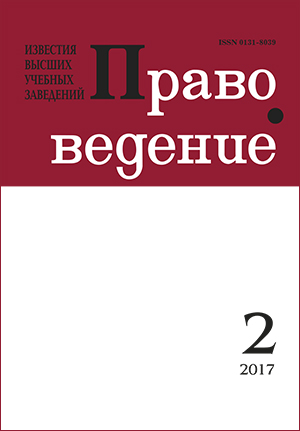State sovereignty: content and transformation in the era of globalization
Abstract
In the article, the author examines the state sovereignty: from its classical definitions which define the sovereignty as an absolute one to the theories which cancel it as an outdated concept, unnecessary in the modern world. The author analyzes the idea of the sovereignty as an essential feature of the state, as opposed to the ideas that it is a feature of the state power. The author discusses the question whether the sovereignty is a set of rights and authorities of the state or whether it constitutes only a formal legal possibility to have rights and authorities. The author focuses on the review of such essential characteristics of the sovereignty as supremacy and independence and inseparability or separability. Transformation of the sovereignty following globalization and in connection with the activities of supranational institutions is also analyzed in the article. A distinction between the concepts of the “state sovereignty” and “international legal personality” is made. The author concludes that the sovereignty is not an absolute, but rather a relative, limited and conventional phenomenon. Relativity of the sovereignty is determined by its dependence on the historical and socio-cultural context. It is limited because of different limiting factors in different eras: the God, the Church, law and order, international law, human rights, supranational institutions. The content of the sovereignty is determined by interdependence with other social and legal phenomena, with the society and it is updated in every new era, thus manifesting its conventionality. In addition, the concept of the sovereignty includes the legal communication. The legal communication in the context of the sovereignty is revealed in two aspects: an internal one (legitimate activity of the authorities within the state in accordance with the national and international law) and an external one (foreign policy in accordance with the international law) and involves dependence of the sovereignty on the public opinion, as well as on international recognition. This internal and external legal communication is an essential feature of the sovereignty of the constitutional state.
Keywords:
state sovereignty, state, state power, globalization, supranational institutions, international organizations, international legal personality
Downloads
References
Downloads
Published
How to Cite
Issue
Section
License
Articles of "Pravovedenie" are open access distributed under the terms of the License Agreement with Saint Petersburg State University, which permits to the authors unrestricted distribution and self-archiving free of charge.




